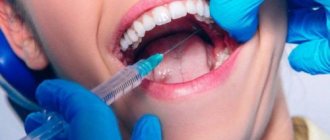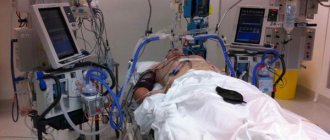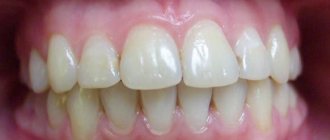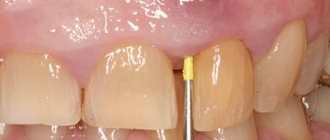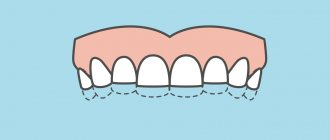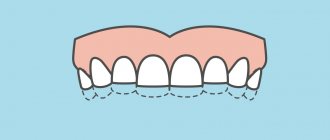Chewing or grinding of teeth in a child
Chewing or smacking in sleep is an uncontrolled contraction of the oral masticatory muscles, accompanied by a sharp clenching of the jaws, grinding of teeth, smacking, excessive salivation, creaking and other symptoms. In medicine, this problem is called “bruxism.”
The period of time during which a person chews can range from a few seconds to 5-10 minutes. Typically, during the entire sleep phase, several episodes of pathology can be noticed. If one episode lasts more than 15 seconds, cracks and chips in the teeth and soft tissue injuries may occur.
Experts have linked a variety of slurping sounds, chewing, and teeth grinding to other sleep disorders. They accompany somnambulism, snoring, urinary incontinence at night, and the occurrence of nightmares. The popular version attributes the symptoms of bruxism to infection with worms. However, in reality, night sounds of teeth and the presence of parasites in the body are in no way connected.
Most often, manifestations of bruxism, when a person periodically swallows saliva, grinds teeth, smacks or chews, are associated with psycho-emotional disorders, for example, depression, stress, mental overload. Excessively active activities before bedtime, overexcitation, growing internal anxiety, and general tension provoke restless sleep.
If the episodes last no more than 10 seconds and occur 1-2 times per night, then this may not indicate any disease, but simply be an individual feature.
This is especially true for young children, who are often subject to reflexes, and chewing at night is a kind of continuation of the sucking instinct or may indicate the child’s hunger.
Reasons for chewing in your sleep
A person chews in his sleep for several reasons:
- Features of the psyche of young children. Children handle emotional stress and stress differently. Even some positive emotions, but excessive ones, can manifest themselves as nighttime symptoms of bruxism. In this case, the child should be shown to a neurologist to exclude possible pathologies of the central nervous system.
- Teething or changing milk teeth to molars . This process is often accompanied by discomfort, pain, and itching. A sleeping baby literally wants to scratch his gums, but does not control himself in his sleep, so he chews or grinds his teeth.
- Various orthodontic pathologies - malocclusion, diseases of the jaw joints, abnormal structure - can lead to the fact that the baby seems to chew food not only in his sleep, but also during daylight hours.
- Another reason why people suffer from bruxism is heredity . The risk of its manifestation in children increases if a similar pathology is observed in one of the parents.
- Nightmarish dreams. Too much stress during a night's rest can cause unconscious movements of various muscles, which is manifested not only by grinding, but also by moving the tongue in sleep, twitching of the arms and legs, blinking, and tics.
- Nasal congestion , enlarged adenoids and other disturbances in normal breathing cause anxiety and overly active work of the facial muscles.
- Manifestations of bruxism are accompanied by a deficiency of magnesium, calcium, amino acids and B vitamins, which affect the functioning of the central nervous system and muscles.
- Insufficient development of jaw muscles . A newborn baby must be fed only with milk or formula, and from 6 months it is necessary to introduce complementary foods, constantly changing the structure of dishes. If a child primarily eats pureed or blended food, the jaw muscles do not work. If there is no load, grinding or chewing may occur during sleep.
In the presence of helminths, it is indeed possible that such a symptom may occur, but it is not caused by the presence of parasites as such, but by general discomfort in the body, intoxication, which makes sleep restless and intermittent.
Treatment
Smacking in your sleep is not considered a pathology and does not threaten your health. Rather, this problem is not the sleeper himself, but his environment. There are several secrets that will help solve the problem of teeth movement and grinding:
If such symptoms are caused by a pathological condition or some disease, medications are selected only by a doctor. If a pathology is diagnosed, treatment will not be aimed at eliminating grinding or chewing, but at the root cause.
Source
Hypersalivation in children
Increased salivation in children is not uncommon. It can be triggered by completely different reasons:
In infants, increased salivation is normal. It is due to the fact that their salivary glands are formed only by the second or third month of life. When this happens, your baby may initially be unable to cope with the increased saliva production. But over time, he gets used to swallowing it, and the drooling stops. Also, hypersalivation very often accompanies the process of erupting the first teeth. Therefore, if at three or four months you notice that the child has become irritable, restless, constantly dragging everything that comes to hand into his mouth, and a lot of saliva is flowing from his mouth, then you most likely have no reason to worry - it’s time for appearance of the first teeth.
Hypersalivation can also occur when some irritating substance gets into the child’s mouth. Viral diseases can also lead to increased salivation. Stomatitis can also cause hypersalivation. The fact is that stomatitis often occurs because an infection accumulates in the mouth, and saliva can slightly suppress its reproduction. Therefore, the body includes a kind of protection against harmful microorganisms in the form of excess saliva.
But there may also be more serious reasons, such as poisoning with heavy metals, particularly lead. This may also be a symptom that the child is developing a gastrointestinal disease - enteritis, gastritis, hepatitis, or has become infected with worms.
In some cases, false hypersalivation is observed. This means that the child actually produces a completely normal amount of saliva, but for some reason he does not swallow it. Then an excess of it accumulates in the mouth. Sometimes an inflammatory process (angina) or paralysis of the pharynx leads to impaired swallowing.
As you can see, there are a great many reasons for hypersalivation. There are quite harmless ones, but there are also dangerous pathologies that can threaten health and even life. As soon as you notice that your child’s secretion of saliva has increased or for some reason he does not swallow it, you should immediately go to the doctor.
But in infants and children from one to two years old, the most common cause of hypersalivation is that teeth are cutting or stomatitis is developing. Moreover, there can be a great variety of stomatitis. By their nature, they can be infectious diseases or they can be provoked by mechanical or chemical damage to the oral mucosa. If these two reasons are excluded, then a more thorough diagnosis should be carried out.
It is important to rule out more serious health problems, such as a brain tumor or congenital disorder.
Do not underestimate the harm that hypersalivation can cause to a child’s fragile body. Firstly, because of this, the digestion process may be disrupted, and in adulthood the child may have problems pronouncing sounds. This phenomenon is called dysarthria. With this pathology, a large amount of saliva prevents the child from pronouncing and mastering words. Because of this, speech may be slurred. It is more difficult for such children to develop, and the process of their socialization may be difficult.
In very young children, salivation is an unconditioned reflex. With age, when the child develops higher nervous activity to a greater extent, psychological aspects can become the cause of hypersalivation. Frequent emotional experiences and severe nervous shocks can lead to increased saliva secretion. Even positive but strong emotions can be an unexpected cause of increased salivation. For example, if a child is looking forward to being given something that he thinks is very tasty. And negative emotions can also be to blame
This is why it is so important to take care of the child’s emotional peace. Remember that you need to protect not only his physical health, but also his psychological balance
Sleep-disordered breathing in children
Obstructive breathing disorders during sleep can be assumed when a child's parents or relatives notice respiratory arrests during night sleep. A shortened breathing period is usually caused by a blockage of the airways. Tonsillitis and adenoids in children can grow to a size larger than the lumen of the child's respiratory tract. Inflammation and infection of the lymphoid tissue of the nasopharynx, located on the sides and back wall of the pharynx, lead to their growth and blockage of the airway.
During episodes of blocked breathing, the child may appear to be struggling to breathe (the chest rises and falls during breathing phases), but air does not enter the lungs. Often these episodes are accompanied by spontaneous premature awakening of the child in order to compensate for the lack of breathing. Such periods of respiratory blockage (obstruction) occur several times during the night and cause disruption to the child’s sleep physiology.
Sometimes, due to the inability to carry air and oxygen into the lungs to ensure proper breathing, a decrease in the level of oxygenation of the blood occurs. If these situations are prolonged, there is a risk of severe dysfunction of the heart and lungs.
Obstruction of night breathing is most often detected in children aged 3 to 6 years. Often observed in children with Down syndrome and other congenital pathologies that cause disruption of the movement of air through the respiratory tract (for example, an increase in the size of the tongue or an abnormal decrease in the lower jaw).
What are the causes of obstructive sleep apnea in children?
In children, the most common cause of airway obstruction during sleep is enlarged tonsils and adenoids, which obstruct normal airflow at the level of the upper respiratory tract. Infectious processes contribute to an increase in the size of these lymphoid formations. Large adenoids can even completely block the nasal passages and make it impossible to breathe freely through the nose.
There are many different muscles in the structure of the head and neck that help keep the airways open when you are awake to allow air to pass through when you breathe. When a child falls asleep, muscle tone physiologically decreases, thus allowing the tissues to collapse and impair breathing. If the respiratory flow is partially blocked (by enlarged tonsils) during wakefulness, then during sleep the airways may be completely closed to air.
Obesity can also lead to airway obstruction during sleep. While it is a leading cause in adults, obesity is less likely to cause sleep apnea in children.
A rare cause of obstructive sleep apnea in children is tumors or growth of other tissues in the airways. Some syndromes or birth defects, such as Down syndrome or Pierre-Robin syndrome, can also cause obstructive sleep apnea.
What are the symptoms of obstructive sleep apnea in children?
You can point out the most typical symptoms of obstructive sleep apnea, but these symptoms may manifest differently in each child.
Symptoms of sleep apnea include:
- Periods of absence (cessation) of breathing. In this case, the chest will move in and out, but air and oxygen do not pass through the mouth and nose into the lungs. The duration of these periods varies and is measured in several seconds or more.
- Mouth breathing, snoring, just noisy breathing. Breathing through the nose can be completely blocked by enlarged adenoids or tonsils. The child may have a specific “nasal” voice.
- Sleep does not give the child proper rest. This can occur in the presence or absence of obvious periods of awakening during night sleep.
- Increased daytime sleepiness or excitability. Due to the reduced quality of night sleep, the child has difficulty waking up in the morning, is drowsy or hyperexcitable during the waking period.
- Hyperactivity during daytime wakefulness. There may be problems with behavior, schooling or social problems.
Symptoms of obstructive sleep apnea may resemble other conditions or medical problems. You should always consult a doctor for an accurate diagnosis.
How to treat obstructive sleep apnea?
The treatment method for obstructive sleep apnea will be chosen by your doctor based on several points:
- child’s age, health status, medical history
- causes of airway obstruction
- the possibility or impossibility of carrying out specific procedures, treatment and examinations for your child
- prognosis of the course of the disease
- Your opinion and preferences in treatment will also be taken into account
Treatment of obstructive sleep apnea is based on the causes of its occurrence. Since the most common cause is enlarged adenoids and tonsils, treatment consists of surgical removal. Your otolaryngologist will discuss with you the stages of treatment, the risks and the need for a particular treatment.
If the cause of the disorder is obesity, treatment will be less invasive, including weight loss and, in some cases, the use of CPAP therapy (a special mask during sleep to keep the airways open) may be necessary. This mask creates increased air pressure (CPAP) in the airways. The device is not fully adapted for children and can be difficult for a child to tolerate, since he or she must sleep wearing a mask.
How is obstructive sleep apnea diagnosed?
You should see a doctor for evaluation if your child's breathing becomes noisy during sleep or snoring becomes noticeable. You may be advised to consult an otolaryngologist.
In addition to a general clinical examination, diagnostic procedures may be recommended:
- completion of a sleep questionnaire (by parents, possibly with the help of a doctor)
- examination of the upper respiratory tract by an ENT doctor.
- -Sleep study using polysomnography. This is the best method for diagnosing obstructive sleep apnea, or the “gold standard”. This test can be carried out on a large number of children, however, some of them, especially young ones, may have difficulties due to the child’s lack of cooperation during the test. Two types of studies are possible: polysomnography or cardiorespiratory monitoring (for young children - using a reduced number of electrodes). The child will sleep in a specialized laboratory. During the study, a number of parameters will be recorded:
- brain activity
- electrical activity of the heart
- blood oxygen content
- movements of the chest and abdomen
- muscle (motor) activity
- amount of respiratory flow through the nose and mouth
During sleep, all episodes of apnea or hypopnea will be recorded:
- apnea – complete absence of respiratory flow
- hypopnea – partial decrease in air flow through the upper respiratory tract with a significant decrease in oxygen in the blood
Based on laboratory testing, sleep apnea becomes significant in children if more than 10 episodes are observed per night, or one or more episodes every hour. Some experts define problems as significant if a combination of one or more episodes of apnea and/or hypopnea are recorded every hour.
Symptoms of obstructive sleep apnea may reflect other conditions or medical problems. In any case, consultation with a pediatrician is necessary.
Why does a 2 month old baby drool? Is this normal?
Many young parents are frightened by the fact that their two-month-old child begins to blow bubbles and drool; they look for the cause in diseases and disorders of the body, although in reality everything is much simpler and there is absolutely nothing to worry about.
If a baby is drooling at 2 months, this is normal.
It's not normal if this doesn't happen. At two months of age, the salivary glands, which were previously in a “sleeping” state and secreted a very small amount of viscous fluid, begin to actively work. At two months, the glands develop and a significant amount of saliva begins to be produced. The baby does not yet know how to swallow it, because before there was no need for this, so he simply releases saliva out. Plus, kids love blowing bubbles, so it also keeps them entertained.
The swallowing reflex is fully formed only by 4-5 months of life, but for now the little man copes with the situation in his own way, and this should be rejoiced as a new stage in his development. True, by the time the baby learns to swallow saliva, his teeth will begin to cut, so it’s better not to hide the bib just yet - he will need it for a long time. It should be borne in mind that teeth begin to form much earlier than they erupt through the gums, so a 2-month-old child is also drooling for this reason.
When a curious baby begins to put everything in his mouth, and 2 months is the appropriate age for this, salivation is further provoked. Therefore, there is no need to worry, it is better to take the necessary measures - get bibs and wipe your beloved child’s chin more often so that constant phlegm does not cause irritation.
If you think your child is salivating more than normal, you can check to see if the abnormality is caused by a medical condition. Most often, young children suffer from allergic rhinitis, which can be triggered by dust, flowering plants and other standard causes of allergies.
Unpleasant sensation in the throat when swallowing
Unpleasant sensations when swallowing are a symptom that accompanies most ENT diseases. Discomfort in the throat is most often associated with the occurrence of inflammatory processes in the mucous membranes of the respiratory tract. Squeezing, soreness, itching, burning and suffocation can signal the development of sore throat, pharyngitis, laryngitis, mononucleosis, etc.
Only a specialist can accurately determine the type of pathology after the patient has undergone manometry, radiographs and pharyngoscopy examination. When discomfort appears in the throat, many patients develop cancerophobia (fear of detecting a malignant tumor). However, delaying a visit to a specialist can worsen your health and provoke asphyxia.
Why do you experience discomfort in the throat when swallowing? Often, unpleasant sensations when swallowing saliva occur due to psycho-emotional stress. Constant stress, irritation, and depression can lead to overstrain of the muscles located in the lower part of the pharynx. Thus, a so-called “hysterical lump” is formed in the airways, which disappears on its own within a few hours.
Pain and a feeling of a lump in the throat can occur as a result of dysfunction of individual organs and systems, injuries or the development of an infectious disease. Common factors that cause discomfort in the throat include:
If the sensation of a lump in the throat is accompanied by enlargement of regional lymph nodes, hyperthermia and weakness, in 95% of cases this indicates the development of septic inflammation in the respiratory organs.
Is poor sleep a cause for concern?
Poor sleep in a healthy baby can signal that he wants to eat or drink, he needs to change diapers, or feel the warmth of his mother’s hands. In such cases, after waking up, the child groans, but after performing all hygienic procedures and feeding, he calms down.
Causes of sleep disturbances in children
Scientists say: interrupted sleep and frequent awakenings at night occur in 30% of children under the age of 3-4 months. In 20% of babies, night sleep disturbances are observed up to 6 months, and in 10% of cases, these disturbances persist into 1 year and later.
American neurologists and somnologists have developed a classification according to which sleep disorders in childhood are divided into two groups:
- Primary - problems with sleep and awakening are not associated with obvious external causes and are not accompanied by any painful manifestations.
- Secondary - caused by dysfunction of organs and systems of the child’s body (allergic reactions, emotional disorders, diseases of the ENT organs and digestive tract, and others).
Physiological features of children's sleep
Primary sleep disorders are most common in infants. The reason for difficulty falling asleep and frequent awakenings at night lies in the infant’s inability to fall asleep independently and in the inability to sleep continuously.
Favorable sleep conditions often help improve a child's sleep:
- Fresh air promotes sound, healthy sleep, so you should lull your baby to sleep in a well-ventilated room. Sleeping in the open air not only improves its quality, but also increases the child’s immunity and the child’s body’s ability to resist colds.
- Good sleep depends on the temperature in the room, the comfort of the pillow and blanket. The baby should not freeze or overheat while sleeping.
- Most babies from 2-3 months, waking up due to an uncomfortable position, can fall asleep without parental help, independently changing the uncomfortable body position in the crib. However, children with increased emotional sensitivity need the presence of their mother. Child psychologists and neurologists say: the desire to sleep with mom is a physiological need of the baby, and not a stupid whim. Mother's hugs contribute to the child's full mental development and normalization of sleep.
Increased salivation during teething
Saliva is also a kind of antibacterial agent. It contains a special substance that has antimicrobial properties.
Since children put everything into their mouths, saliva performs a protective function. Closer to six months, heavy drooling in a baby can indeed indicate the imminent appearance or eruption of teeth. Being deep in the gum, the tooth still grows, rising higher to the surface and causing pain to the baby. At the same time, saliva effectively moisturizes the gums, thereby softening the discomfort during the teething process. During this period, do not forget to give your baby all kinds of teethers, just keep them clean in the refrigerator door. Special cooling gels also help a lot during teething.
In some babies, teething may be accompanied by a fairly high temperature (sometimes above 39), which suggests that salivary fluid alone was not enough to provide an antiseptic effect.
Don't worry about this, even if you have to spend several days with your child in the hospital under the supervision of doctors. This condition usually lasts about three days (sometimes five). This is also the norm, it’s just that your baby’s body has its own individual characteristics.
With excessive salivation, quite often parents observe wheezing in the chest in their children, especially in the morning after waking up. At the same time, the baby may cough heavily, sometimes this happens not only in the first hours after sleep, but also at night. Many mothers are alarmed by this fact, and they immediately run to see a pediatrician at the clinic. Of course, for your own peace of mind, it is better to do this to rule out colds or viral diseases. accompanied by a wet cough, redness and sore throat. But more often than not, everything is really fine with the child. Simply an excess of saliva causes congestion in the larynx. In this case, experts recommend placing the baby on his tummy more often.
It is advisable for the baby to sleep on his stomach or side more often. You can also place a folded diaper or thin pillow (sold especially for newborns) under your head. On his back, he may choke and wake up from his own cough.
So, excessive salivation in children in the first year of life is a completely normal phenomenon, but still, sometimes, this fact can be a signal of the presence of other diseases.
How do children sleep?
The quality of sleep, the alternation of its phases and wakefulness change as the child grows older:
- In the first 3-4 months, the baby sleeps, as a rule, 16-18 hours a day. The child usually wakes up every 2-4 hours, as he feels hungry, and falls asleep when full. The feeding regimen does not depend on the time of day, since the child’s body does not react to the change of day and night. Night feedings at this age are considered normal. Starting from the 3rd week, infants begin to develop periods of wakefulness.
- After the first 3-4 months, the duration of night sleep increases, the child can sleep continuously for 5-6 hours.
- Periods of wakefulness increase as we get older, due to increased brain activity and functionality. Changes in sleep patterns (slower falling asleep, early awakening from naps) should not alarm parents as long as children remain active during periods of wakefulness and appear healthy. These changes indicate that the child has grown and needs a different sleep schedule.
The duration of sleep is individual for each child. It may be related to his temperament, physical and psycho-emotional state.
Lump in the throat
Sometimes it is unpleasant for the patient to swallow, but the throat does not hurt. The absence of pain and temperature may indicate hypertrophy of the mucous membranes of the pharynx and chronic diseases. But most often the cause of a lump in the throat is nervous tension.
The occurrence of an unpleasant symptom rarely signals the development of cancer pathologies. In 70% of cases, discomfort goes away without therapy after 4-5 days. But if the sensation of a lump in the throat persists for a week, it is advisable to undergo an examination by an otolaryngologist. The main causes of discomfort include:
The presence of a sour taste in the mouth may signal the penetration of gastric juice into the esophagus. It contains aggressive acids that can damage the mucous membrane of the pharynx and cause pain.
How to help your child
Now let’s take a closer look at how to deal with hypersalivation in a child. By the way, did you know that with normal secretion, a person produces about 2.5 liters of saliva per day? But what should you do if you notice that your child’s salivation has clearly increased?
It is important to understand the specific reason. If the reason is that teeth are being cut, you should calm down and take a wait-and-see attitude.
In this case, no treatment will be needed. You just need to wait until the teeth erupt and saliva flow returns to normal.
But what if it turns out that the cause of hypersalivation was a certain inflammatory disease? Often the cause may be, for example, ulcerative stomatitis. It is caused by various viruses and bacteria. In response to the onset of inflammation, the body turns on the defense mechanism and secretes more saliva. But this does not mean that you need to leave the body alone with the disease.
It is important to support him with competent therapy in a timely manner. All medications must be prescribed exclusively by a doctor
If treatment is neglected, the infection can affect the salivary glands themselves, and this can seriously threaten the health of the baby. Such diseases should be treated by a dentist or pediatrician. As soon as the source of inflammation is eliminated, salivation should return to normal.
Another reason is helminth infection. This is a very typical problem for children, as they are guilty of putting everything into their mouths. This could be dirty hands, toys, garbage, and even shoes. It is not surprising that from time to time their body is attacked by multiplied helminths. If you begin to suspect that this is the reason, you should contact your pediatrician. He will direct you to take the necessary tests and, based on their results, prescribe therapy.
Neurological causes of sleep disturbance
Sleep disorders associated with disruption of the central nervous system are caused by the following reasons:
- the baby was born prematurely;
- During pregnancy, the woman suffered serious illnesses and took potent medications;
- As a result of a complicated birth, the child was born with asphyxia and various physical impairments.
In such situations, the formation of the nervous system occurs differently in each child. Its defeat is necessarily accompanied by behavioral and mental disorders, and sleep problems. To determine the level of damage, the nature of the disease, and exclude other causes, you should contact a pediatric neurologist.
Excessive salivation in children two years of age and older
If the child is 3 years old and drooling, then in any case it is worth going to the hospital. Only specialists can answer the question of why this happens in a child at this age. They will determine whether drug therapy is needed in this case or whether this moment can be waited out.
When getting rid of these manifestations, it is necessary to compare treatment methods to the pathology itself. However, we cannot remain idle. Children with this problem may develop speech impairment, because a large amount of clear liquid interferes with the ability to pronounce words well. Subsequently, this can lead to delayed development and sociopathy.
At this age, children may begin to erupt molar teeth. This may cause hypersalivation. As is the case with infants, the problem can arise due to ENT diseases, diseases of the digestive system, stomatitis, gingivitis, allergies. If the problem manifests itself mainly at night, then the baby may have a helminthic infestation.
If the problem causing hypersalivation is pathological in nature, then treatment must be carried out to prevent exacerbation.
Folk remedies should be a complement to medication methods. Young children can benefit from rinsing the mouth with decoctions of the following herbs:
Your local pediatrician should choose the weed. You can also use infusions by adding them to a bath with warm water. Tinctures of nettle, black elderberry, calendula, St. John's wort or chamomile are suitable here.
You can rinse your mouth with a decoction of chamomile or nettle. But this method should not be used as the main one. It is more of an adjuvant therapy that complements drug treatment. Rinsing your mouth with herbs will not cope with serious problems.
Also, do not forget that the use of folk remedies must be agreed with the attending physician. Many herbs are highly allergenic and are therefore prohibited for children.
Therapy is carried out in two directions:
If a month-old baby or an older baby is drooling, then medications are prescribed that reduce the functions of the salivary glands.
However, they are prescribed in critical situations, for example, if a newborn chokes at night, which can be fatal.
The solution to the problem itself depends on the cause of its occurrence. In cases of colds and stomatitis, therapy will be prescribed by a pediatrician and dentist.
If you need to get rid of parasites, a course of antiparasitic drugs and preparations with bifidobacteria will help.
At home, to alleviate the condition of the baby, you can do the following:
It must be remembered that strong salivation is a temporary phenomenon, most often associated with the appearance of teeth in the baby and it should be endured. After teething, your child will feel better. However, it is necessary to exclude other factors that caused this trouble. To do this, record your symptoms and report them to your pediatrician.
We offer you to watch a video about one of the most common diseases among children - stomatitis, its causes, symptoms and methods of treatment:

